By Kebba AF Touray
The African Commission on Human and People’s Rights (ACHPR) commenced the 81st Ordinary session of the Commission on Thursday, 17 October 2024 in the Gambian capital Banjul, with a focus on the human rights situation in Africa.
Speaking at the opening, Dr. Joseph Whittal, the Chairperson of the Network of African National Human Rights Institutions (NANHRI), said the Commission has made remarkable strides in promoting human rights across the continent.
“Its efforts in establishing frameworks and mechanisms serve as cornerstones for human rights protection on the continent. The convening of the first joint forum for special mechanisms is a testament to the Commission’s commitment to foster dialogue and cooperation between different stakeholders on the continent,” he said.
He said human rights cannot be separated from development because they are essential in ensuring inclusive, equitable, and sustainable growth, adding that NANHRI advocates for the integration of human rights standards into the AfCFTA framework. He expressed solidarity with the Commission in protecting human rights on the continent, and in supporting the institutional collaboration of the Commission towards strengthening the capacity of the Commission in the protection and promotion of human rights on the continent.
H.E. Olof Skoog, the EU’s special representative for Human Rights, recounts that in the first days of January 2017 that in the Gambia, the rightfully elected President was blocked from assuming office after winning the elections. He said that together, the African countries at the Security Council, worked with them, to back the new legitimate President.
With hard work and persuasion, he said they achieved backup from other members of the Security Council, and he was able to personally call President Barrow (in exile), to congratulate him and to give him the support of the council at the time.
“Since 2017, the Gambia has consolidated democracy and its global support for accountability for human rights, and hosting the ACHPR is a testimony to this commitment,” he said. He however decried that regretfully, the Security Council is no longer united on such issues on democracy and human rights, and called for the need for Europe and Africa to work together to defend democracy and human rights. He said human rights should be the compass by which they navigate their national policies and global engagements.
“Effective upholding of human rights starts with inclusion without exceptions and without discrimination,” he said; that today, they find themselves unfortunately in a difficult time, when it comes to human rights, adding that crises are piling up on economic, health, climate, and conflict-related challenges, and the world needs a collective effort to mitigate and resolve these challenges.
As the representative of the UN High Commission for Human Rights, Christian Makosa said the 2024 theme of the 81st gathering, resonates deeply with the standards and objectives of their office; that they continue to strengthen solidarity with the commission, and to promote fundamental human rights on the globe.
He added, “The right to education is enshrined in the Universal Declaration of Human Rights specifically in Article 28 of the Declaration which requires member states to guarantee the right to free, mandatory, and elementary education for all.” Education he said is a powerful catalyst for sustainable development, social cohesion, and the realization of other human rights, and said the journey to provide quality education for all is faced with lots of challenges such as inequality, poverty, and conflict, which continues to deprive millions of their right to education.
“Our office remains committed to promoting the right to education even in the most challenging situations, and our work extends from conflict zones to refugee camps, where we ensure that everyone, including the most vulnerable individuals, has access to education,” he said.
Hon. Jean-Marie Nibirantije, the Chairperson of the Pan African Parliament and member of the Committee on Justice and Human Rights said the Human rights situation in Africa is confronted with challenges such as conflict and discrimination. He said the PAP and other partners will continue to work in synergy, by enhancing their capacity to respond to these challenges, and to ensure that human rights are at the forefront of their agenda.
The Gambia’s Justice Minister, Dawda Jallow, declaring the 81st Session of the ACHPR open, said conflicts in Africa, the Middle East, and Ukraine among others, have led to mass displacement and sufferings, “challenging the world to reaffirm the importance of human rights.”
For Africa, he said human rights are essential for socio-economic development, cultural identity, and the foundation for sustainable democracy.
He said Agenda 2063 embodies this vision and aspires for a continent built on good governance, democracy, and rule of law, and said the journey towards this vision, requires addressing key challenges.
‘‘In the recent past, we emphasized AfCFTA as an opportunity for economic growth and integration,” he said. He however said that structural reforms, improved governance, and infrastructure development, are crucial to harness this potential, along with embracing digitization and reduction in energy costs.





















